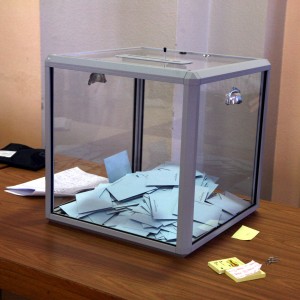Last month, a Russian non-governmental election-monitoring organization, “Golos” (A Voice), published [RUS] an alternative Election Codex on the internet, that is designed to provide free, fair and transparent elections in Russia. It is one of a few recent examples of publicly developed draft bills that are promoted online.
Freedom and transparency of elections in Russia has taken a turn for the worse with the election of the second Russian president Vladimir Putin. The presidential election in 2000 and the Duma (parliament) election in 1999 were the last elections recognized by the Organization for Security and Co-Operation in Europe (OSCE) [EN] as “consistent with internationally recognized democratic principles.” All further elections failed to meet both OSCE and Council of Europe requirements for democratic elections.
Under the guise of “managed democracy” [EN] and later “sovereign democracy” [EN] both election practices and the legal framework were transformed in order to put down the opposition and limit voter rights. Legal changes included the abandonment of governor elections in the Russian regions, raising the bar for entrance to the State Duma from 5 to 7 percent of the vote for political parties, tightening requirements for political parties, etc. As a result, the number of political parties shrank from several dozens to just seven [RUS] (and only four are currently represented in the State Duma).
At the end of 2008, a group of 31 non-partisan election experts, human right activists, political analysts and journalists led by Arkadiy Lyubarev got together to propose an alternative to the current electoral system. Realizing that neither the state nor the current political parties are interested in changing the system, “Golos” began a series of round table discussions in Moscow, Saint-Petersburg, Samara, Kazan and other cities. The result of their work is a 141-pages long document [RUS] that was published on June 9th, 2010.
Among other things, new Election Codex proposes to:
- simplify the language of the election law;
- combine all the legal procedures connected with elections to one law (currently there are 5 laws that define different moments of elections, with some laws overlapping the others);
- lower the bar for the parties from 7 percent to 4;
- simplify party registration procedure;
- establish criteria for signature validating (now, one of the most common practice to dismiss a candidate is to recognize the signatures a candidate collected as invalid);
- introduce transparent ballot boxes;
A not so active discussion of the proposal online included both typical propaganda and some creative critique. Denis Dvornikov, an executive secretary of a pro-Kremlin astroturf NGO, Civic Control, described [RUS] the document in a cynical manner, calling it “an empty, populistic document… that is aimed to feed starving political technologists.”
Cynical, materialist explanations are common in Russian online debate. The meta-discourse behind it describes all civil rights organizations as “paid by the West”, or “pursuing their own commercial interests”, while any idealistic or humanistic motivation is disregarded.
Another political technologist Dmitri Sapegin, wrote about the utopianism of the Codex [RUS]:
Задал вопрос – если это проект, то КАК вы собираетесь проводить новый Кодекс через Госдуму? …Там же по вашим словам – сидят игроки на политическом поле, которым не нужны новые нормативные конструкции, задевающие их интересы. Мне ответили: «Наш проект – создание Кодекса. Пока. Дальше – посмотрим».
Livejournal user V_Martynov, however, criticized [RUS] the document from the position of federalism: the election codex gives very tight limits on the ability of regions to design their own legislative structures.
Nowadays, a project like Golos and the Election Codex can only be discussed and promoted online. Since no state-controlled TV or radio will give public exposure to it, and no political party will support it. Bloggers seem to have no interest (and trust) in it either.
One the one hand, lack of serious online discussion can be explained by the complexity of the topic, numerous technical details, and the overall low level of legal culture in the country. On the other hand, the more significant factors might be the apathy and lack of trust most Russian people feel towards elections, discredited by almost ten years of authorities abusing the system.








